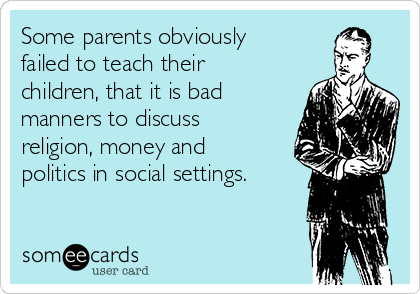When I was a kid there were certain things that you did not discuss (at home or in public). Don’t talk about religion, politics or how much money you make. Other rules to follow: don’t ask a woman how old she is and don’t ever question adults.
They were all good rules in theory. I know that my parents, like many parents during the 80’s, wanted to teach us how to be respectful toward others. But, I believe that the problem with these rules is that a generation of us grew up not knowing how to navigate tough conversations. And, we then avoided talking to our parents about things that we should have because we weren’t allowed to talk about them!
This is not a criticism of my parents as I believe it was more a sign of the times. However, times have changed and, well, I’ve changed. I want to prepare my kids to handle with grace, openness and maybe some kindness when they are in uncomfortable situations. And how are they supposed to know how to do this if they don’t get the practice?
Our lively dinner table conversation is filled with discussions on racism, xenophobia (Corona Virus, I’m looking at you), politics, LGBTQ issues and money (so basically all of the topics that would make my father shudder). We talk with the older kids about where they get their news sources from and what their friends are talking about with the upcoming election. We talk about the financial decisions that we make as a family (or how will they know how to handle their own money some day?). Yep, we talk about it all, and with kids from six to seventeen at home, it can make for interesting discussions.
I have two reasons for keeping open communication at home. Yes, I want my kids to get lots of practice talking about uncomfortable things with other people when they are out in the wild. My other reason is an ongoing attempt to keep our lines of communication open so that I can hopefully be a safe person.

To be clear, I do NOT expect my kids to talk to me about everything (because that would be weird), but I do hope that they will talk to me about more than I did growing up. After all, I’d rather they come to me about the kid who texted them about harming themselves than their friends (or try to handle it themselves).
Look, I know my kids talk to their friends about all of this stuff. I also know that anyone under 25 does not have a fully-formed brain. So, yes, I’d rather have them talk to me than each other.
I have learned through trial and error that the key to this kind of communication is to make no topic taboo (see above) and, to NOT FREAK OUT. No matter what your kid says, you cannot, under any circumstances, lose your cool. This is crucial. You do not get very many chances, especially when they get to be tweens and teens. Failure to chill a few times may result in your kid keeping their mouth shut rather than risk you making something, “into a big deal.” So, keeping a calm facade while freaking out on the inside has been my go-to these days.
Because we talk about everything under the sun, my kid telling me that they aren’t going to a party because they know there will be some “smoking” going on is a good thing. This can be some really challenging territory too. Yes, I want to emphasize the seriousness of certain situations when they tell me about things. I also need to be the person that will stay calm so they can feel safe talking to me. And, (this is hard for me), I have to talk WAY less than I want to because they didn’t talk to me to get a lecture. I ask a few questions, keep a calm face and then, once they leave, I can talk to my husband or a trusted friend about what just went down. And, sometimes, I come back to the topic the next day, “tell me more…” is my go-to along with, “how do you feel about that?”
Side note here: I am not the cool parent and we do not have a free-for-all at our house. If you step out of line, there will be consequences. If you admit to doing something you shouldn’t we will talk about how great honesty is but consequences will still come. Overall, I hope that having a little back-up from their parents as they navigate life is a good thing.
So, who’s ready to discuss the characteristics and lasting effects of our patriarchal society?













